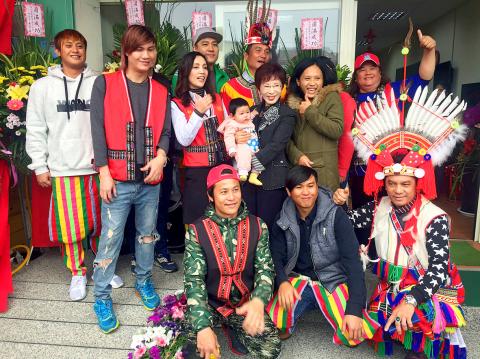Chinese Nationalist Party (KMT) Chairwoman Hung Hsiu-chu’s (洪秀柱) office on Friday said its own poll had a different result from one published by a Chinese-language weekly magazine, which showed Hung trailing former vice president Wu Den-yih (吳敦義) and KMT Vice Chairman Hau Lung-bin (郝龍斌) in the party’s chairperson race.
A poll, commissioned by the China Times Weekly magazine and published on Friday showed Wu leading with 20.1 percent support, followed by Hau on 17.4 percent and Hung on 16.8 percent.
In another poll, also by the magazine, that excluded pan-green supporters, Hau bested Wu with 24.7 percent to Wu’s 23.1 percent, and Hung came in third with 21.3 percent.

Photo: CNA
Hung’s office said that the magazine’s poll numbers “had apparent gaps with the general consensus and our office’s poll results.”
“The magazine’s survey only had about 400 respondents; we would refrain from commenting on its validity,” it said, adding that a poll commissioned by the office and conducted between Feb. 2 and 6 with more than 1,200 samples from pan-blue supporters showed Hung had 65 percent support as party chairwoman.
“Hung’s cross-strait peace policy platform was shown to have 78 percent support and she was also leading in the chairperson race, though without obtaining a majority,” office spokesman Yu Hao (游顥) said, without providing precise numbers.
Hau and Wu yesterday said they would not place too much importance on the poll numbers, with Hau adding that what matters is being the first in the final vote.
Asked whether Hung’s office conducted the poll using the party headquarters’ resources, Hau said Hung should make public the poll if the party paid for it, adding that Hung has vowed to distribute party resources fairly and complete a list of party members, according to party regulations.
“What matters most now is for the party headquarters to quickly help set up an election committee with representatives recommended by all the chairperson candidates,” he said.
Additional Reporting by Shih Hsiao-kuang and Wang Jung-hsiang

Japanese footwear brand Onitsuka Tiger today issued a public apology and said it has suspended an employee amid allegations that the staff member discriminated against a Vietnamese customer at its Taipei 101 store. Posting on the social media platform Threads yesterday, a user said that an employee at the store said that “those shoes are very expensive” when her friend, who is a migrant worker from Vietnam, asked for assistance. The employee then ignored her until she asked again, to which she replied: "We don't have a size 37." The post had amassed nearly 26,000 likes and 916 comments as of this

US President Donald Trump said "it’s up to" Chinese President Xi Jinping (習近平) what China does on Taiwan, but that he would be "very unhappy" with a change in the "status quo," the New York Times said in an interview published yesterday. Xi "considers it to be a part of China, and that’s up to him what he’s going to be doing," Trump told the newspaper on Wednesday. "But I’ve expressed to him that I would be very unhappy if he did that, and I don’t think he’ll do that," he added. "I hope he doesn’t do that." Trump made the comments in

Tourism in Kenting fell to a historic low for the second consecutive year last year, impacting hotels and other local businesses that rely on a steady stream of domestic tourists, the latest data showed. A total of 2.139 million tourists visited Kenting last year, down slightly from 2.14 million in 2024, the data showed. The number of tourists who visited the national park on the Hengchun Peninsula peaked in 2015 at 8.37 million people. That number has been below 2.2 million for two years, although there was a spike in October last year due to multiple long weekends. The occupancy rate for hotels

A cold surge advisory was today issued for 18 cities and counties across Taiwan, with temperatures of below 10°C forecast during the day and into tonight, the Central Weather Administration (CWA) said. New Taipei City, Taipei, Taoyuan and Hsinchu, Miaoli and Yilan counties are expected to experience sustained temperatures of 10°C or lower, the CWA said. Temperatures are likely to temporarily drop below 10°C in most other areas, except Taitung, Pingtung, Penghu and Lienchiang (Matsu) counties, CWA data showed. The cold weather is being caused by a strong continental cold air mass, combined with radiative cooling, a process in which heat escapes from